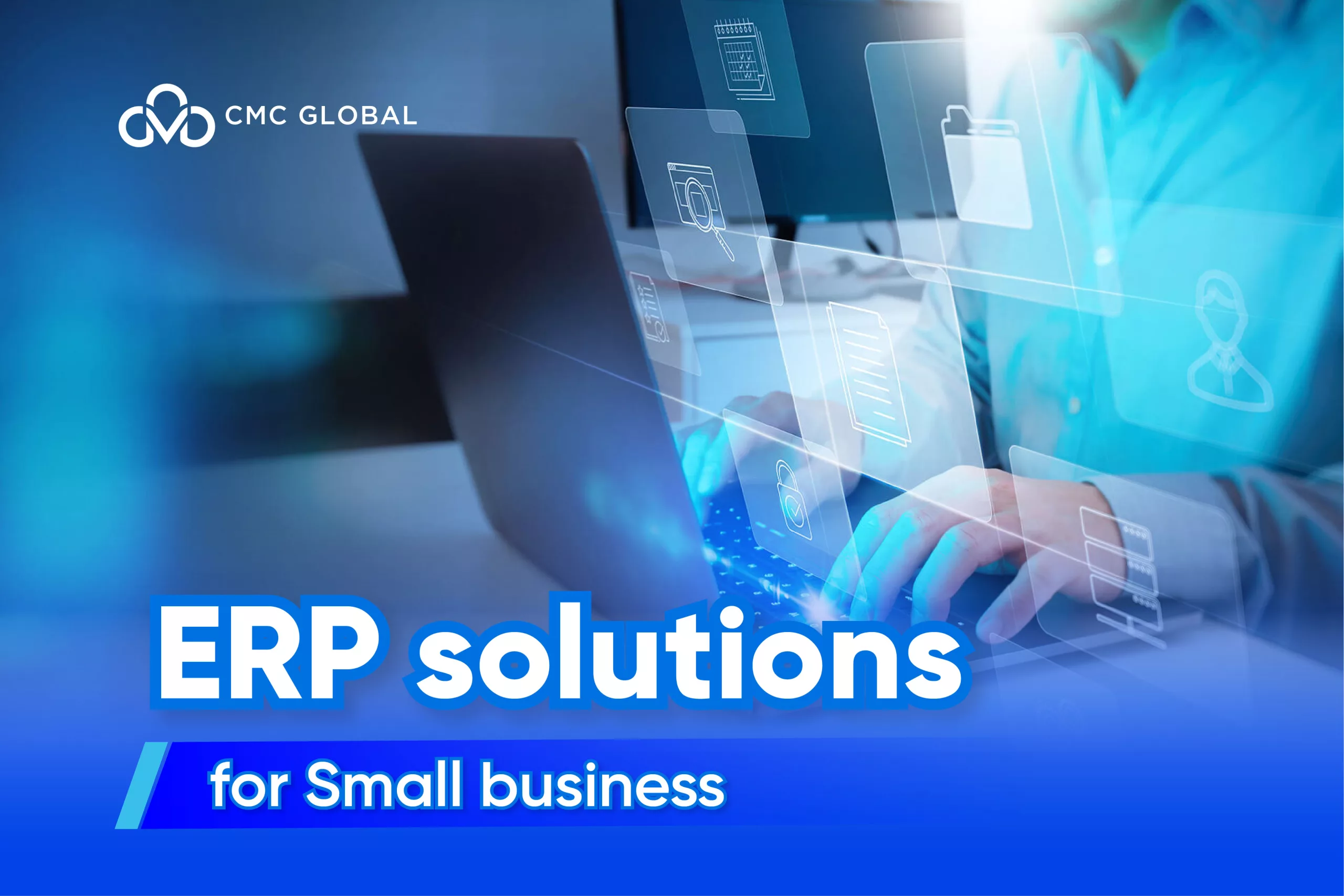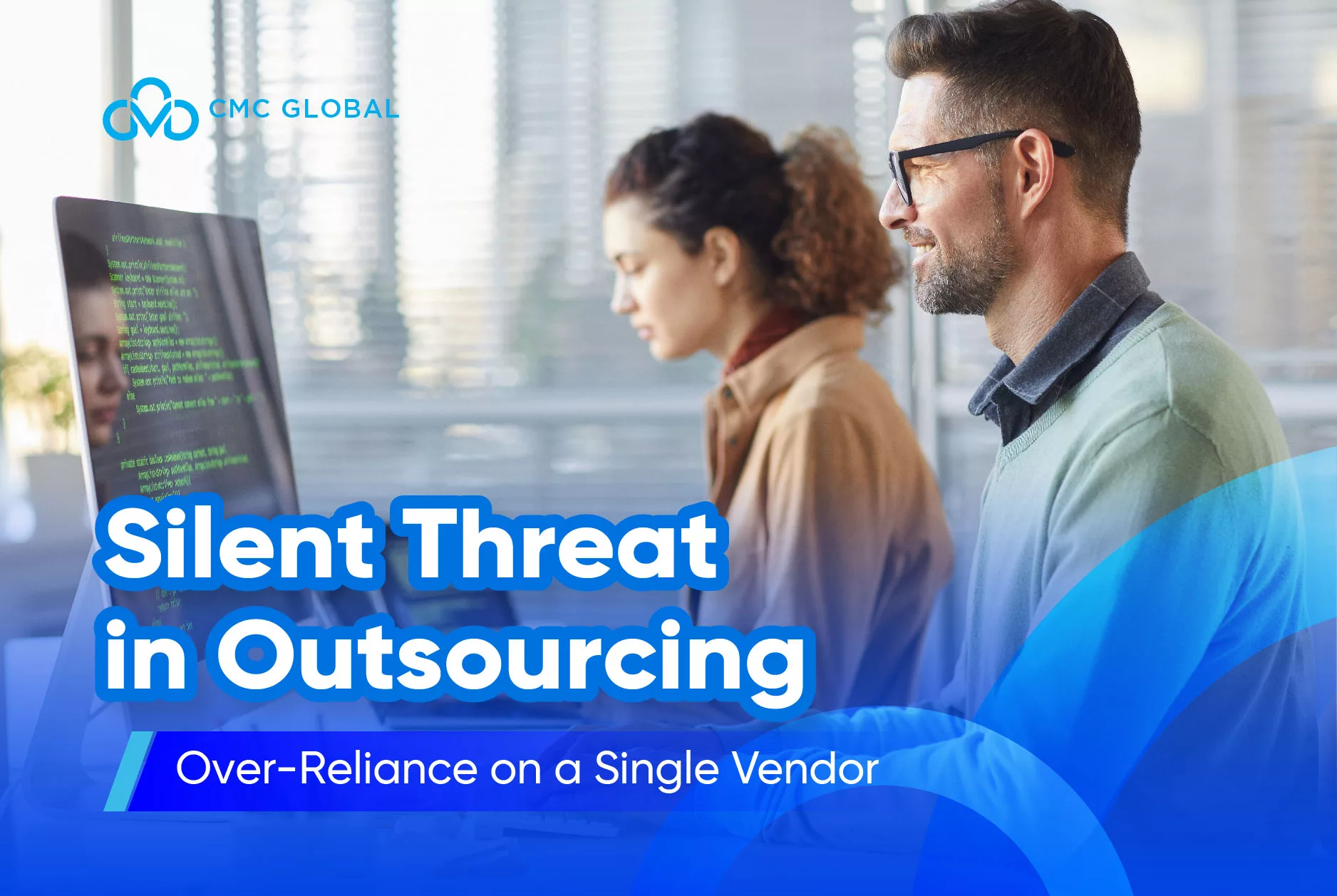Your business is finally taking off. Everything is operating properly, and all systems are ready!
However, this is when sales may get stuck or slow down. A company cannot grow until it establishes well-organized, connected channels. For a growing business, the next step is looking into enterprise resource planning (ERP). It helps to synchronize processes and prepare your company for growth.
What Is An ERP Solution?
Enterprise resource planning (ERP) is software that helps businesses connect their daily operations. It is an affordable system that allows for the flow of transactional data from numerous sources while also managing ongoing business activities like accounting, human resources, sales, marketing, and data security.
IBM engineers developed ERP software for small businesses in 1992 to improve and automate activities. Since then, the ERP business has become a highly competitive field with a wide range of platforms to choose from.
Top 10 Best ERP Solutions for Small Business
#1 Microsoft Dynamics 365 (Business Central)
Microsoft Dynamics 365 Business Applications is an innovative, cloud-based set of ERP solutions.
The numerous modules in this suite feature several preset procedures. They are hosted on Microsoft Azure (a highly secure global cloud infrastructure), making it one of the top ERP solutions for business on the market.

Features of Microsoft Dynamics 365 Business Central
- Offers access to web, desktop, and mobile devices.
- Provides pre-built interfaces with other Microsoft products, including Outlook, Excel, Word, SharePoint, OneNote, PowerPoint, Teams, and more.
- Contains AI-powered workflows, billing and accounting operations.
- Power BI provides real-time business intelligence (BI).
- Dynamics 365 includes its own Microsoft app source ecosystem for ISVs, add-ons, and third-party applications like Mobile WMS for warehouse management.
- Offers customization tools like APIs and VS Code.
- Excellent worldwide risk compliance and regulations.
- Includes an IoT integration framework for machine connectivity.
- The “Tell-Me Feature” enables consumers to find what they need.
- D365 Business Central (previously Dynamics NAV) is a unified ERP software for small enterprises that have up to 500 transactions to manage each day.
#2 SAP S/4HANA Cloud
SAP provides business solutions tailored to companies across a variety of industries and scales. As a top provider of ERP solutions, it is committed to investing in cutting-edge technologies such as IoT, AI, RPA, and cloud-based delivery methods.
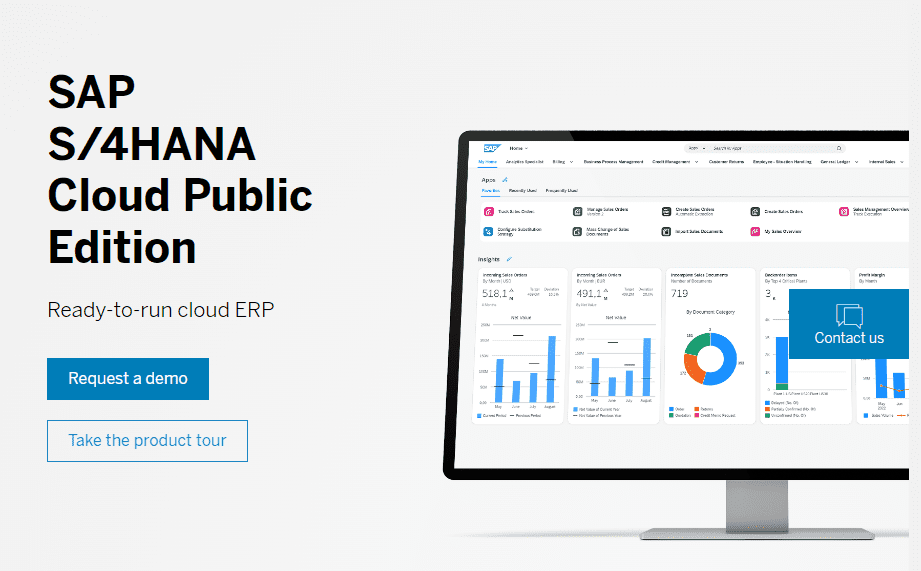
Features of SAP S/4HANA Cloud:
- Powered by AI and analytics and caters to the needs of all business types.
- Supports intelligent process automation and end-to-end business procedures.
- Includes built-in cybersecurity.
- Supports compliance with essential regulations.
- Enables firms to integrate sustainability into their core business processes and operations.
#3 Oracle NetSuite
Oracle NetSuite offers a comprehensive cloud-based business management solution for companies of all sizes.
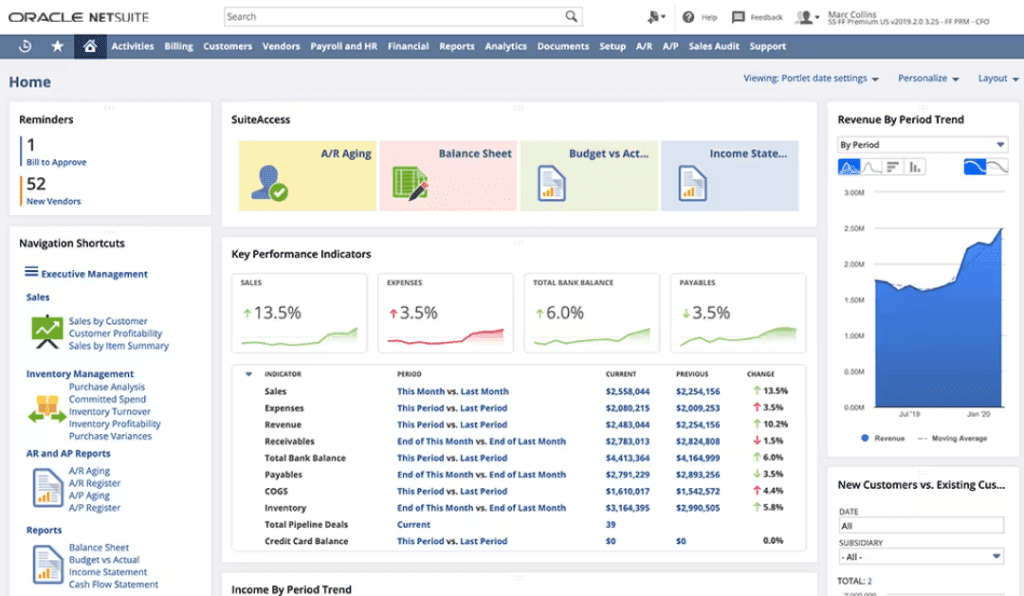
Features of Oracle NetSuite:
- Offers ready-made role-based dashboards, reports, and key performance indicators (KPIs).
- Offers a full suite of tools for managing accounting, order processing, inventory management, production, supply chain, and warehouse operations.
- Includes features to offer you a 360-degree view of your subsidiaries, business units, and legal entities.
- Allows for a phased implementation approach to meet business objectives when needed.
- Provides access to real-time financial, operational, and transactional details across the company.
#4 Sage Intacct
Sage is well-known for providing comprehensive accounting, payroll, and payment systems that are seamlessly integrated. Their ERP software serves various industries and businesses, including start-ups and enterprises.

Features of Sage Intacct:
- Offers cloud accounting, planning, human resources, and payroll options for small and medium-sized companies.
- Offers quick, predictive performance insights.
- Covers AI-powered procedures and connected workflows for finance, billing, source to pay, and more.
- Supports connectivity with Salesforce CRM.
#5 Acumatica
Acumatica is one of the best ERP solutions for small businesses that aim to achieve digital resilience. You may rapidly integrate your preferred tools and applications, and it is ideally suited for networks and mobile devices.
Acumatica is well-known for its efficiency and adaptability. Furthermore, using the platform ensures that your business’s activities run smoothly and produce better results.
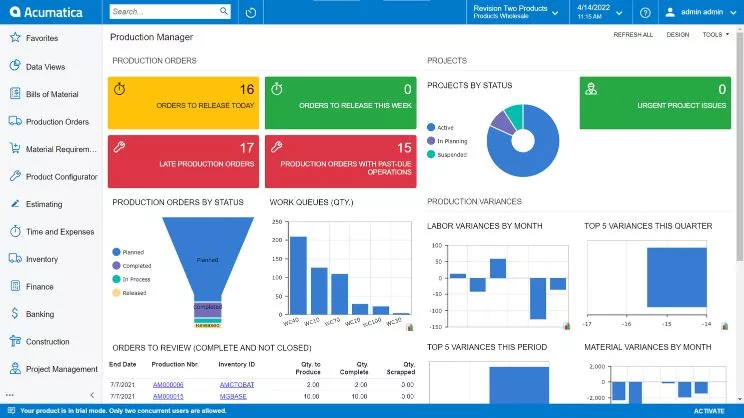
Acumatica là gì
Features of Acumatica:
- Designed for mobile and telework settings.
- Seamlessly integrates with the collaborative tools of your choice for connected business.
- Offers operational continuity, efficiency, and flexibility.
- Best for expanding small and mid-market companies that need a solution to future-proof their business.
#6 SAP Business One
SAP Business One is created specifically for small businesses that have the potential to grow. This cloud-based solution is similar to Microsoft Business Central.
The single platform enables you to access all of your company’s key insights at the appropriate time, allowing you to make informed decisions in real time.

Features of SAP Business One:
- SAP B1 is built especially for small businesses.
- AI-driven analytics helps you reduce the cost of managing your business, from financials, purchasing, inventories, sales, and customer interactions to project management, operations, and human resources.
- With a flexible, modular, powerful, and simple user interface, businesses may have thorough visibility and control over their entire operations.
#7 TallyPrime
Tally is one of the easiest and oldest ERPs (launched in 1986) for small businesses. Tally is designed with care so that you do not have to spend much time on it and can get better results.
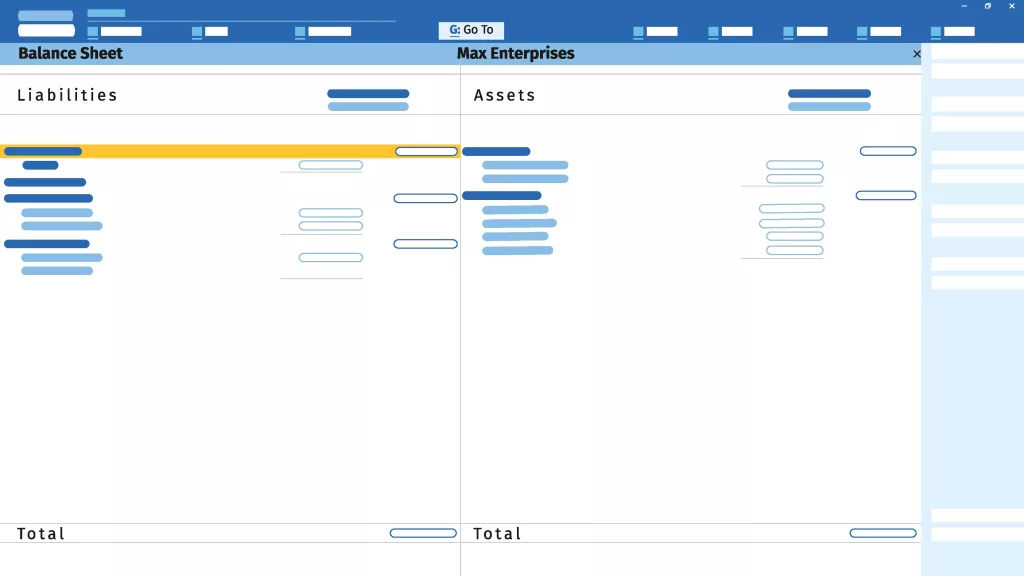
Features of TallyPrime
- Complete accounting and finance management functionality
- Includes inventory management and support for numerous units of measurement.
- Management of receivables and payable
- Budget management and financial forecasting tools
- Offers solutions for payroll management and attendance tracking.
- Integrates with numerous bank systems to provide smooth transaction processing.
- Allows support for many languages and out-of-the-box configuration.
- Ideal for business reporting and analysis.
- Exporting data in multiple formats (Excel) for external usage.
#8 Odoo ERP
Odoo ERP is an open-source platform that is extremely configurable for business-specific needs.
The platform is designed to help businesses in a variety of industries and professions, such as manufacturing, inventory, accounting, sales, and CRM.
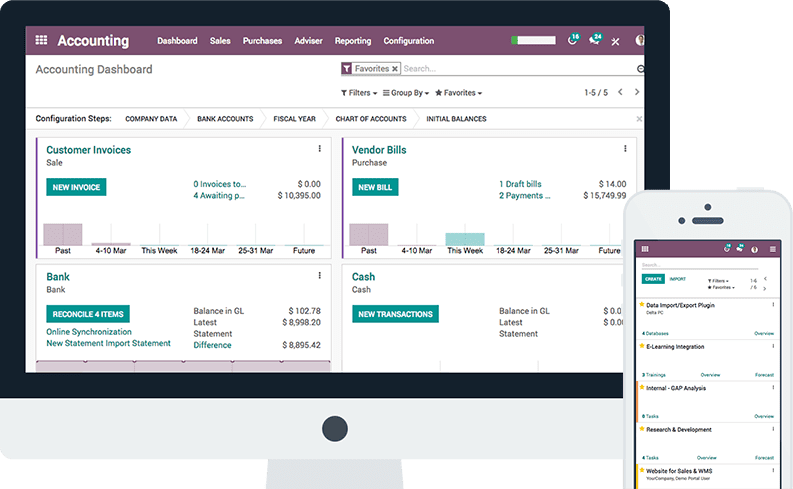
Features of Odoo ERP
- Suitable for companies of any size and budget.
- Integrate other applications easily.
- Keep all operations and activities in one location.
- User-friendly and innovative, with various business management modules that you may require occasionally.
- 67% of small firms choose Odoo ERP as a low-investment ERP software.
#9 SYSPRO
SYSPRO is a global ERP software company that specializes in key manufacturing and distribution businesses across a wide range of sectors.

Features of SYSPRO
- Provides an interactive web platform that makes it easy to connect with suppliers online.
- Supports straight integrations with Governance, Compliance, and Supply Chain Management connectors.
- Offers forecasting and advanced inventory optimization tools that enable companies to generate diverse demand sources.
- Allows for the capture, management, and resolution of client complaints.
- Includes a programmable pricing engine, allowing organizations to configure prices, breaks, and discounts.
- Allow for low-code or no-code settings, as well as APIs that allow businesses to connect to many different apps and solutions.
- Includes standard portals for customer account administration, supplier account management, and quote requests.
- Give manufacturers the option to implement this ERP in the cloud, on-premises, or hybrid.
#10 Certinia ERP Cloud
Certinia ERP is a customer-centric cloud software solution based on the Salesforce platform. It enables firms to consolidate, simplify, and automate their financial management procedures in one place.
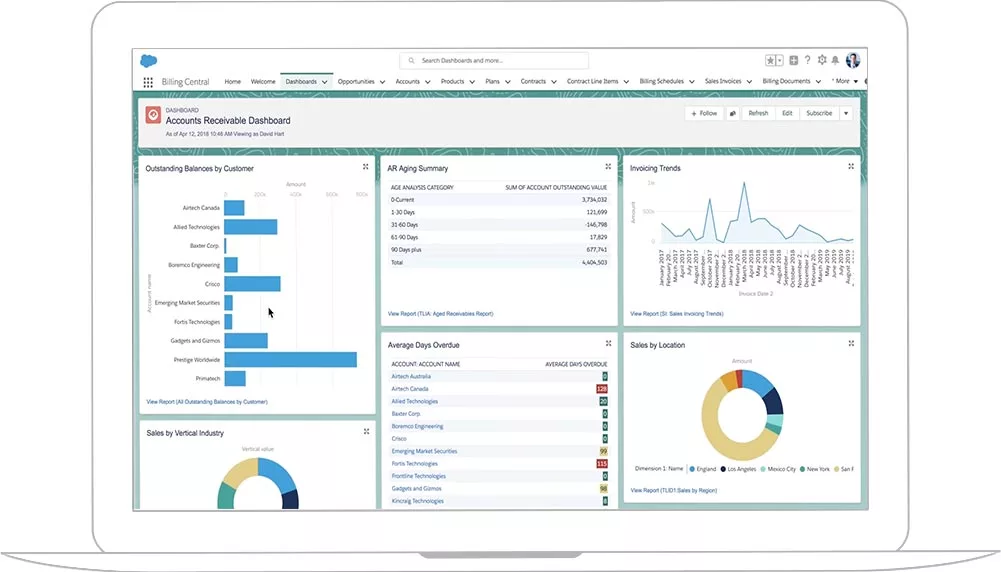
Features of Certinia ERP Cloud
- Accounting and finance activities can be automated, and regular duties can be accomplished with a few clicks.
- Offers real-time financial analysis, modeling, and compliance reports
- Certinia enables subscription and usage billing, fixed-fee services, time and material (T&M), and other billing procedures that are specific to the customer’s requirements.
- Automating revenue recognition and cost schedules allows for a speedier period-end close.
- Certinia’s ERP analytics and reporting deliver unrivaled business insights, allowing you to boost revenue and streamline processes.
- ERP Communities lets customers view account information, make payments online, and track activity and balances.
How to Select the Suitable ERP Solution for Your Company
#1 Understand the reason behind the requirement for an ERP solution for small business
When reviewing a client’s ERP software requirements, we frequently discover that businesses demand a solution that integrates data across all functional areas in order to make choices based on credible data.
However, rather than new technology, simple adjustments in operations, such as inventory management, might result in enhanced efficiency. If you are having trouble determining why, contact one of our ERP professionals to sort it out.
#2 Identify the influencing factors.
Your company data reflects your fundamental business processes. While some of these processes are essential to your competitive advantage, others can limit your efficiency and overall progress.
At CMC Global, we start by identifying pain areas in your current processes in order to increase efficiencies and discover the best solution to support your long-term goals.
When deciding among the many ERP choices on the market, it is critical to analyze the features and benefits to find the best tool for your firm. While well-known companies such as SAP, Microsoft, and Sage may be familiar, you should also analyze each solution’s specific benefits and support.
Consulting with ERP specialists, like CMC Global, can help you choose the suitable ERP solution for your company.
